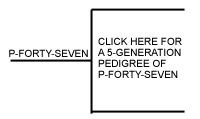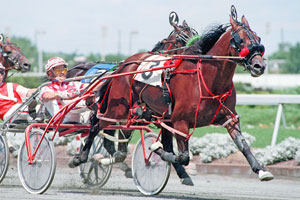The Pedigree of P-Forty-Seven
September 28, 2005,Dean A. Hoffman
 The human connections of P-Forty-Seven weren’t the only winners in Thursday’s Little Brown Jug.
The human connections of P-Forty-Seven weren’t the only winners in Thursday’s Little Brown Jug.
There are several prominent and successful pacing stallions that were delighted to see P-Forty-Seven win the race that they didn’t win.
Consider these stallions: The Panderosa, Artsplace, Western Hanover, No Nukes, Albatross, and Abercrombie.
They were all outstanding race horses and later successful sires, right? They have that much in common. But they also have in common that they are close up in the pedigree of P-Forty-Seven and none of them won the Little Brown Jug.

P-Forty-Seven
Let’s start with The Panderosa, sire of the Jug winner. He looked like God’s gift to pacing in the first half of the 1999 season, but the wheels came off him after his Meadowlands Pace triumph. He broke stride in the Oliver Wendell Holmes at the Meadowlands on Hambletonian Day. He won a heat of the Cane at Freehold, but broke stride in the final.
In the Jug, The Panderosa went off at even-money and broke stride going into the first turn. He was eliminated.
The Panderosa is a son of Western Hanover, who had won two legs of the Triple Crown in ’92 before encountering a bulldog named Fake Left on Jug Day. Western Hanover lost the Jug and the Triple Crown by a nose in the raceoff.
Western Hanover is a son of No Nukes, a foal of 1979 who competed in the ’82 Jug. No Nukes was a horse with a blistering turn of speed, but he was a big dude and not suited for half-mile track turns. In the ’82 Jug, he finished fourth in his elim and failed to make the final.
If you want to go back one generation further in P-Forty-Seven’s paternal line, you will find Oil Burner, a horse that might have been a factor in the ’76 Jug, but, alas, he was not eligible.
The Panderosa is out of a mare by Coal Harbor, who raced in that same ’82 Jug as No Nukes. He fared better than No Nukes, finishing 2-3, but he also didn’t find the winner’s circle.
And who was the sire of Coal Harbor? Why, none other than Albatross, whose upset loss in the ’71 Jug was one of the greatest stunners in the sport’s history.
If you go to the female side of P-Forty-Seven’s pedigree, you’ll see that he’s out of a mare by Artstplace. Without question, Artsplace didn’t do much wrong in his three seasons at the races, winning more than $3 million. But when it came time for the 1991 Little Brown Jug, Artsplace was on the shelf sick.
Artsplace is a son of Abercrombie, who came into the ’78 Jug as a heavy favorite. The little horse could go around turns like he was born turning left, and he came to Delaware razor sharp. But Abercrombie left without a Jug trophy as the hardware went to upsetter Happy Escort that year.
Again, if you want to go back to Abercrombie’s sire, you find another sterling pacer that didn’t win the Jug. His name was Silent Majority and he was not eligible in 1972. If he had been able to race in the Jug, he would have given Strike Out a real serious challenge.

The Panderosa
The Panderosa
Getting a Jug winner is a real feather in the forelock of any stallion, and now The Panderosa has a Jug winner from only his second crop.
From his first crop came the Messenger winner Metropolitan and also the 1:49.2 pacer Ponder. Both Metropolitian and Ponder raced in the same Magical Mike division on Jug Day and Ponder stormed three wide through the final turn to just miss Maltese Artist by a half-length.
The Panderosa has also sired such 1:50 pacers as Town Champion, Hop Sing, Santastic’s Pan, Mypanmar, and Kublai Pan.
His colts have raced significantly better than his fillies, although Breeders Crown winner Restive Hanover did quite well for herself as a juvenile. She’s bouncing back from an injury now and hopes to make some headlines later in the year.

Artsplace
Artsplace dam Cohiba Mary
It’s significant to note that P-Forty-Seven isn’t the first good son of The Panderosa from an Artsplace mare. The millionaire Metropolitan is also out of a mare by Artsplace as is Leading X Ample, p, 3, 1:50.1 ($440,110) a winner of a Meadowlands Pace elimination earlier this year.
It was interesting to me that Artsplace didn’t have a single starter in this year’s Jug—quite a rarity for the sport’s perennial pacing kingpin—but he sired the dam of the winner. There aren’t that many Artsplace mares in production yet, but, in addition to P-Forty-Seven, Metropolitan, and Leading X Ample, daughters of Artsplace have also produced Western Terror, Please Me Please, and Northern Sky.
P-Forty-Seven is the second colt from Cohiba Mary p, 5, 1:50.3 ($413,389), who was driven to her record by Eric Ledford at Balmoral in the summer of ’99. P-Forty-Seven went through the sales ring as a yearling under the name Chronic Hanover and sold for $45,000.
It’s significant to note that Cohiba Mary had a mark of 1:50.3, her dam had a mark of 1:54.3, and her granddam had a mark of 1:56.3 in 1980.
This family traces back to Maine breeder James Mendelson, who lived in Belfast on the Penobscot Bay. He owned Nib’s Sister, a good pacing mare in the Pine Tree State in the 1960s. Starting in 1972, Mendelson sent Nib’s Sister to Most Happy Fella four consecutive years and certainly never regretted it.
Her four foals by Most Happy Fella netted Mendelson three $100,000 winners, but the first one was by far the best.
Her name was Miles End Brenda and she was a standout pacing mare in the early years at the Meadowlands. In her career, she started 105 times, finishing on the board 77 times and earnings $365,163. Remember, this was 25 years ago.
The second Most Happy Fella from Nib’s Sister was a colt named Miles End Steve p, 4, 1:56.2 ($130,444) and her third foal was Miles End Dianne, the third dam of P-Forty-Seven.
As a 3-year-old in 1980, Miles End Dianne earned $101,786 and nabbed a 1:56.3 mark at the Meadowlands.
Mendelson bred Miles End Dianne to Bret Hanover twice and got male foals before breeding her to Niatross and getting the 1984 filly Miles End Denise.
Miles End Denise was owned by Mike Kimelman of Blue Chip Farms. She wasn’t a superstar by any means, earning only $32,000. She took her 1:54.3 mark in a 1987 time trial.
Predictably, Miles End Denise was bred to Blue Chip Farm stallions—-On The Road Again, Goalie Jeff, and Magical Mike—with the exception when she had the filly Cohiba Mary by Artsplace.
Cohiba Mary is a Hanover broodmare and has a Cam’s Card Shark yearling colt selling at Harrisburg this fall.
When Cohiba Mary was mated to The Panderosa in 2001, it was truly a meeting of equals, at least in terms of their pedigrees. Consider this:

Albatross
The Panderosa is by a stallion (Western Hanover) whose is out of an Albatross mare. The Panderosa is out of a mare by Coal Harbor, a son of Albatross.
Cohiba Mary is by a stallion (Artsplace) who is out of an Albatross mare. Cohiba Mary is out of a mare by Niatross, a son of Albatross.
Thus both The Panderosa have identical 3male x 3 female crosses to Albatross, meaning that Albatross is found in the third generation of both the male and female side of their pedigrees.
Cohiba Mary was bred this year to Bettor’s Delight and then to Dragon Again, but I can just bet she’ll be the first mare booked to The Panderosa for 2006. Then we might get another chance to see if the magic of this cross produces another superstar pacer.
